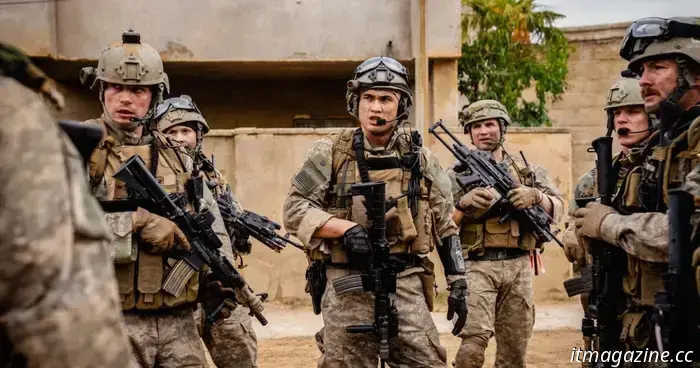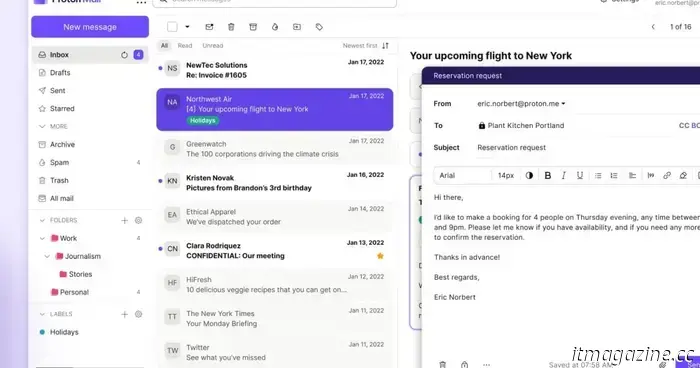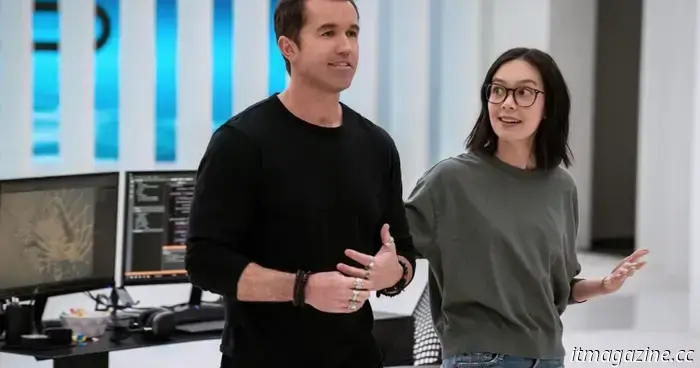
Warfare: Alex Garland and Ray Mendoza talk about camaraderie in their engrossing war film.
As a writer and director, Alex Garland is accustomed to drawing audiences into his unique universes, which range from a zombie apocalypse (28 Days Later) and a dystopian America (Civil War) to a post-nuclear wasteland (Dredd) and an alien-infested setting (Annihilation). In his latest war film, Garland explores the world of a former soldier, Ray Mendoza. The result is Warfare, an immersive new war film co-created by Garland and Mendoza. The cast includes D’Pharaoh Woon-A-Tai as Mendoza, along with Will Poulter, Cosmo Jarvis, Joseph Quinn, Noah Centineo, and Charles Melton.
Warfare centers on a team of Navy SEALs conducting a surveillance operation in Ramadi in 2006. The SEALs seize a multi-level house situated in insurgent territory and take refuge there. However, the mission takes a disastrous turn as they find themselves ambushed from all directions and must fight for their lives. The movie is based on the recollections of Mendoza and other mission survivors. Presented in real time, Warfare is raw, intense, and unyielding, serving as a thriller that offers a relentless portrayal of combat.
In an interview with Digital Trends, Garland and Mendoza delve into the significance of brotherhood, the film’s unique sound design, and their use of long takes during filming.
This interview has been edited for brevity and clarity.
Digital Trends: Let’s start with the word — brotherhood. It’s often used so frequently that it can lose its original significance. Ray, coming from your experience with the team, what does brotherhood mean to you?
Ray Mendoza: It’s prioritizing the bond, relationship, and team over oneself. It’s a group that embodies sacrifice, right? Brotherhood can be found in various contexts, like sports or other fields. If you’re referring to someone as a brother, it implies that you’re putting that bond ahead of your own interests. You have to prioritize what’s best for the team rather than yourself. That’s what brotherhood means to me.
Alex, after creating this film, has your perception of brotherhood shifted in any way?
Alex Garland: I can’t add anything to what Ray said. For me, much of the film centered around Ray’s thoughts and feelings rather than my own. My inclination is simply to find it interesting and strive to comprehend it fully.
As a filmmaker, your work typically invites viewers into the worlds you craft through your writing and direction. For this film, however, you’re stepping into someone else’s reality. Did this change your approach as a writer and director?
Garland: This ties back to what I previously mentioned. My role in this film was to attentively listen to what Ray was expressing. After that, I aimed to consider the perspectives of other individuals connected to the events and incorporate their experiences as well. It wasn’t about interpretation; Ray was clear in his communication. It made me realize that often the challenge in listening stems from our own inability to truly hear what the other person is saying. Ray conveyed everything perfectly. It felt almost zen-like in certain ways.
A24
Ray, you’ve implied that this isn’t just an immersive view of warfare but also a medium for discussing combat. When did you come to recognize your ability to use film as a means to convey a true story?
Mendoza: I’ve always understood this potential. Some filmmakers choose not to utilize their voice in that way or prefer to focus on different themes. I aimed to zero in on a specific aspect. Others may not choose that focus; they pursue other avenues. Throughout every project I’ve worked on, I’ve tried to maintain that focus in some form. I create these opportunities for directors or stunt coordinators, but I don’t get to dictate their filming choices or editing decisions, and sometimes vital elements get overlooked.
Part of this could stem from ignorance or uncertainty—they aren’t sure where to direct their focus, even though the core of it is always present. It has always been there for them; they just might not recognize it. Garland was actually the first to notice it in Civil War. I think that aspect distinguishes him from other directors. It has always existed; they just failed to see it.
What was it like taking on the roles of writer and director?
Mendoza: It was exhilarating. It felt like being deprived for days and having a piece of food placed in front of you. I devoured it as quickly as I could. It was an immediate sense of relief, like, “Let’s go for it. Yes, we’re moving full speed ahead.” And we did.
A significant element that stands out is the way sound immerses the audience in this film. The gunshots, the shouts from the soldiers, the silence following an explosion—sound plays a terrifying role in itself. What were your discussions like with the sound designers and mixers?
Garland:



Other articles
 Proton Mail introduces offline email capabilities for Android users.
The most recent update for Proton Mail on Android now enables users to read, search, and compose emails without an internet connection.
Proton Mail introduces offline email capabilities for Android users.
The most recent update for Proton Mail on Android now enables users to read, search, and compose emails without an internet connection.
 NYT Strands today: clues, spangram, and solutions for Saturday, April 12.
Strands offers a challenging twist on the traditional word search from NYT Games. If you're having difficulty and can't figure out today's puzzle, we've got assistance and clues for you right here.
NYT Strands today: clues, spangram, and solutions for Saturday, April 12.
Strands offers a challenging twist on the traditional word search from NYT Games. If you're having difficulty and can't figure out today's puzzle, we've got assistance and clues for you right here.
-at-Costco-and-Sams-Club.jpg) Best electronics to purchase (and avoid) at Costco and Sam’s Club.
In this article, we examine the popular electronics categories at Costco and Sam's Club. Are there any great deals? Occasionally, but it isn't always a definitive choice in every situation. Here's what you should be aware of.
Best electronics to purchase (and avoid) at Costco and Sam’s Club.
In this article, we examine the popular electronics categories at Costco and Sam's Club. Are there any great deals? Occasionally, but it isn't always a definitive choice in every situation. Here's what you should be aware of.
 I tested Garmin's new subscription, and I really appreciate that it isn't mandatory.
How effective is Garmin's new subscription service? My initial thoughts are that it's beneficial, though not a must-have.
I tested Garmin's new subscription, and I really appreciate that it isn't mandatory.
How effective is Garmin's new subscription service? My initial thoughts are that it's beneficial, though not a must-have.
 These Beats earbuds with noise cancellation are available for $100 today.
The Beats Studio Buds are now available for $100 on Amazon. Experience exceptional sound quality and effective ANC features with these fashionable in-ear headphones!
These Beats earbuds with noise cancellation are available for $100 today.
The Beats Studio Buds are now available for $100 on Amazon. Experience exceptional sound quality and effective ANC features with these fashionable in-ear headphones!
 Mythic Quest has been terminated at Apple TV+, but viewers will receive one final episode.
The series will have the opportunity to present fans with a revised ending, as a new version of the season four finale is scheduled to be released next week.
Mythic Quest has been terminated at Apple TV+, but viewers will receive one final episode.
The series will have the opportunity to present fans with a revised ending, as a new version of the season four finale is scheduled to be released next week.
Warfare: Alex Garland and Ray Mendoza talk about camaraderie in their engrossing war film.
In an interview with Digital Trends, Alex Garland and Ray Mendoza talk about their latest film, Warfare, and share insights on how they captured the action in real time during filming.
